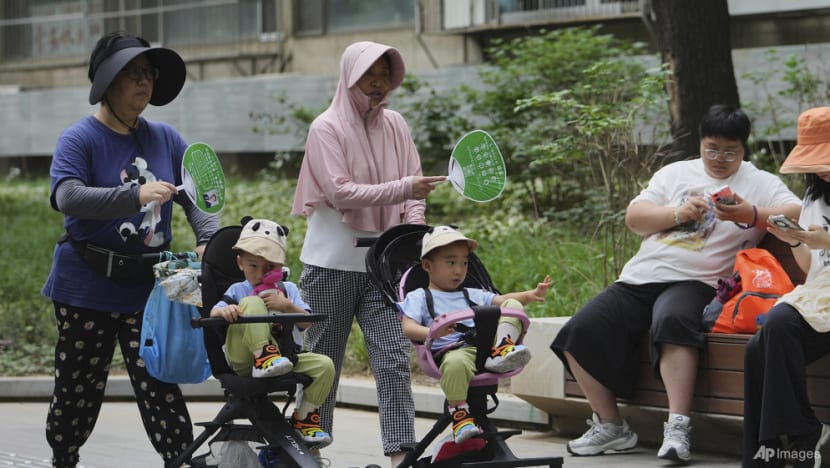Unwed mothers denied childcare subsidies in China, sparking debate
The latest case is of a single mother in Sichuan, who was told by authorities that childcare benefits would be “based on family units”.

Women fan the children on the stroller as they walk along a street, on a sweltering day, in Beijing, Jul 22, 2025. (Photo: AP/Andy Wong)
CHENGDU: For one unwed mother in Chengdu, not having official marriage papers is proving to be precarious.
Writing in an official online forum, the woman, who was not named, asked state health authorities if local children born out of wedlock could still receive childcare subsidies.
“In Shenzhen, those without a marriage certificate are not able to receive childcare subsidies so I was wondering what policies are like in Sichuan,” the woman said, referencing a case that went viral earlier in August.
A single mother in Shenzhen had been told that her child’s birth, while registered, did not meet the criteria as she did not have a marriage certificate.
Final decisions on appeals would also depend on guidance from Guangdong state provincial health authorities.
Officials in Sichuan have followed suit, saying that claiming childcare benefits would be “based on family units”.
Responding on Monday (Aug 18), the Sichuan Provincial Health Commission said childcare subsidies were available to children under the age of three, “born in accordance with the laws and regulations” from Jan 1, 2025.
Applications for childcare subsidies can only be made after completing marriage registration procedures, according to Sichuan health officials.
“Claimants shall meet one of the following conditions - (being) a birth or foster parent of the infant or child. If parents are absent, legal guardians shall claim them,” the Sichuan Provincial Health Commission said.
“In the event of a divorce, the childcare benefit is claimed by the parent with custody of the child.”
China’s government announced in late July that parents would receive annual cash payments of 3,600 yuan (S$643) for each legitimate child under the age of three - a move aimed at boosting the birth rate.
“The childcare subsidy system can directly increase people's cash income,” said Guo Yanhong, vice minister of China’s National Health Commission (NHC), at a press conference in July.
Applicants would need to submit essential documents which prove the child’s identity as well as parent-child relations, such as a medical birth certificate and household registration booklet, in order to claim the subsidies, NHC officials said.
Birth and marriage rates in China now sit at historic lows. Officials recorded around 9.5 million births and 6.1 million registered marriages in 2024, a drop of 20.5 per cent from the previous year.
Four years ago, there were approximately 30 million single mothers in China, according to statistics released by China’s Ministry of Civil Affairs.
New data has yet to be released but single parenthood is said to be on the rise as divorce rates increase.
Around 1.331 million couples filed for divorce in the first half of 2025, up by 4.5 per cent from the same period in 2024, the ministry said.
Fresh debate has erupted online over the recent case in Sichuan, with netizens taking to popular blogs and social media platforms to express their dissatisfaction with the system.
“These subsidies aren’t meant (to help) the birth rate,” a user Kakabula wrote on the Sina Weibo microblogging site. “They are meant (to boost) the ‘men having children’ rate.”
“Turns out that a child isn’t born by the mother, but by a marriage certificate,” Weibo user Ye Zi wrote.
On the other hand, some users have questioned why “normal couples” would not apply for marriage certificates, welcoming the strict requirements as “preventing illegitimate children and mistresses from taking advantage”.
“If children born out of wedlock can receive (the subsidy), then children born to mistresses can also enjoy this benefit, which would make the marriage certificate useless,” Weibo user Ni Xue Shao nǚ wrote.
















